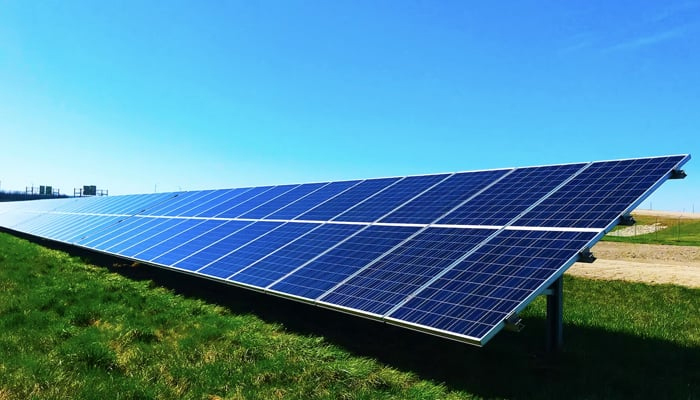Renewable energy should be priority of new govt
Islamabad : Stressing the need to develop a long-term Integrated Energy Plan based on Renewable Energy Transition that may resolve the issue of circular debt and remove economic uncertainties, experts at a high-level policy discourse have suggested devising a country-specific policy for the localisation of RE industry.
The experts were speaking at a roundtable discourse on “Energy reforms agenda and priorities for Pakistan post-2024 election” organised here by Sustainable Development Policy Institute (SDPI).
In wind sector, there is a substantial potential to bring down the tariffs through locally developing concrete towers and using local manpower, the experts said emphasising a much broader focus on demand side management through a better policy approach and monitoring mechanism for energy efficiency and conservation. They were of the view that the new government will have to upscale and expedite the transition from imported fossil fuel-based projects towards local resources.
Former chairperson, NEPRA, Tauseef H Farooqi recommended to diversify the power generation mix by increasing the share of renewables for a sustainable energy portfolio, reduce reliance on imported fuels to increase resilience to vulnerability to external factors such as exchange rates and global conflicts and tackle losses and theft in the power sector.
Senior public policy advisor Dr Khaqan Najeeb said a small team in the Ministry of Power with clear targets to meet power transition can help in this regard. We need to have small human resource, finance and energy experts to resolve IPPs deficit, petrol and diesel prices deregulation and privatisation of power sector, he maintained. NEPRA and OGRA should come as market makers, he said, and stressed the need to engage external expertise.
Earlier, in his opening remarks, SDPI Executive Director Dr Abid Qaiyum Suleri said challenges like energy, economy and digital transformation are ahead, therefore, the new government will have to move towards the solution of these issues with a practical and pragmatic approach. He was of the view that connecting the dots reveals that all challenges are intertwined, thus no issue can be addressed in isolation.
He added that a collective working on all sectors would help boost our economy and enable us better energy governance and adoption of better energy technologies. He said this forum is ready to guide the new government that what concrete steps can be taken to improve the system to build a resilient and sustainable economy.
SDPI Research Fellow Dr Khalid Waleed, who also moderated the session, said that the energy landscape of Pakistan is dominated by affordability crisis, therefore, reliance on renewable energy should be the priority of the new government.
Tanveer Mirza, a representative of Wind Industry, suggested enacting legislation to ensure policy continuity for over a decade or so to achieve desired dividends. He said that the new government should bring clarity in the state decision on renewable energy adoption.
CEO of PRIED Badar Alam said the policy discourse needs to bring public at its centre to ensure inclusive policy development. The new government will have to come up with a plan for a decentralised energy industry to ensure cost efficient solutions.
-
 Why Nicole Kidman 'not Rushing' Into Love After Split From Keith Urban?
Why Nicole Kidman 'not Rushing' Into Love After Split From Keith Urban? -
 Benny Blanco's Dirty Feet In Debut Podcast Divide The Internet
Benny Blanco's Dirty Feet In Debut Podcast Divide The Internet -
 Jeffrey Epstein Blamed King Charles As Andrew Left Trade Enjoy Job
Jeffrey Epstein Blamed King Charles As Andrew Left Trade Enjoy Job -
 King Charles Asked To Lean On Princess Anne To Avoid ‘media Circus’
King Charles Asked To Lean On Princess Anne To Avoid ‘media Circus’ -
 Passenger Wins £10,000 Payout From Heathrow Airport After 100 Ml Liquids Dispute
Passenger Wins £10,000 Payout From Heathrow Airport After 100 Ml Liquids Dispute -
 Eric Dane's Costar Under Fire For Hurling Accusations At Him After His Death
Eric Dane's Costar Under Fire For Hurling Accusations At Him After His Death -
 Queen Camilla Greets The Paddington Bear At BBC’s 500 Words Grand Final
Queen Camilla Greets The Paddington Bear At BBC’s 500 Words Grand Final -
 Chinese Astronauts Finally Reveal Why Spacecraft Left Them ‘stranded’ For 437 Days In Space
Chinese Astronauts Finally Reveal Why Spacecraft Left Them ‘stranded’ For 437 Days In Space -
 Sinitta Makes Shock Admission About Marriage To Andy Willner Post Simon Cowell Heartbreak
Sinitta Makes Shock Admission About Marriage To Andy Willner Post Simon Cowell Heartbreak -
 Bill Gates Calls Ties To Jeffrey Epstein 'huge Mistake,' Reveals Past 'affairs'
Bill Gates Calls Ties To Jeffrey Epstein 'huge Mistake,' Reveals Past 'affairs' -
 Switzerland Announces One-time Compensation For Swiss Bar Fire Victims
Switzerland Announces One-time Compensation For Swiss Bar Fire Victims -
 Ryan Coogler Shares Thoughts About Building Community Of Actors Amid 'Sinners' Success
Ryan Coogler Shares Thoughts About Building Community Of Actors Amid 'Sinners' Success -
 Heidi Klum Gushes Over Diplo Collab 'Red Eye' Despite DJ Falling Asleep During Video
Heidi Klum Gushes Over Diplo Collab 'Red Eye' Despite DJ Falling Asleep During Video -
 Israel Behind Majority Of Journalist Deaths Worldwide, Watchdog Claims
Israel Behind Majority Of Journalist Deaths Worldwide, Watchdog Claims -
 'It Would Become A Circus' : Inside Jane's Turmoil For 'little Sister' Fergie Whose Hidden From The World
'It Would Become A Circus' : Inside Jane's Turmoil For 'little Sister' Fergie Whose Hidden From The World -
 Inside Cardi B's Real Feelings Related To Stefon Diggs Split Post One Year Of Romance
Inside Cardi B's Real Feelings Related To Stefon Diggs Split Post One Year Of Romance




